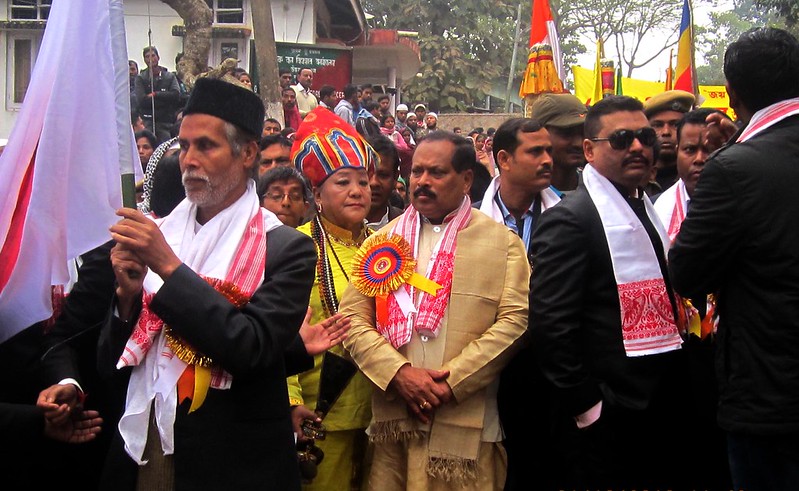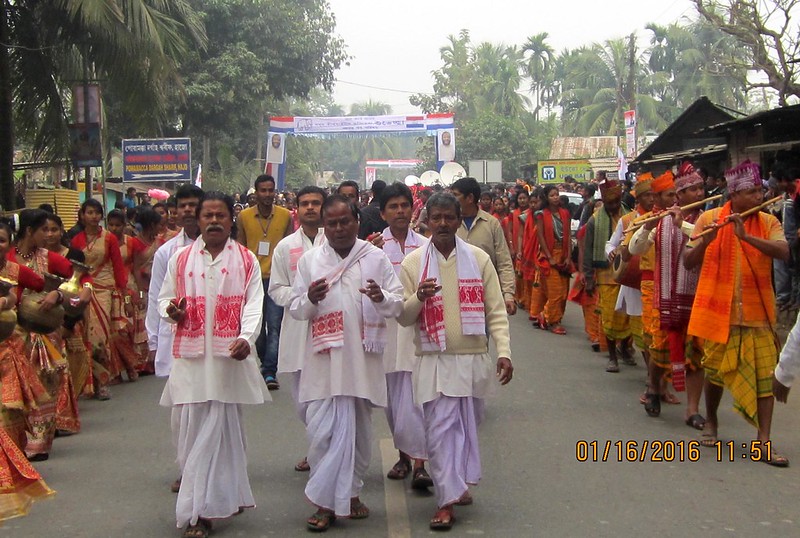Hindu Muslim Unity in Assam | Foundationforpluralism.blogspot.com
How do we change the world?
If each one of us promotes the good stories, goodness will dominate the search engines, and gives hope to the people, it is as simple as that. It does not mean we have to be blind to bad things, it simply means acknowledge and fix the cancer, instead of letting the cancer tear the society apart. Let the good stories be told repeatedly.
Somewhere in a meeting I sat down with two of my Washington friends, Razi Raziuddin and Tariq Farooqui Saheban and enjoyed their stories about how integrated and the beautiful relationships they had with Hindu families around them. I have heard similar stories from my Hindu friends in Dallas. I think it is time for each one of us to write our stories, one short story at a time. and I will be happy to share it at Foundationforpluralism.blogspot.com and or MikeGhouseforIndia.blogspot.com. I need the ready story in word file to post it. You can create your own blog as well.
We need to tell our stories, the good stories giving hope to people.
The following story was shared by my friend Yogi Sikand, whom I admire for his pluralist credentials.
The story opened up several windows of beautiful things for me, but right now, I will share two small things from Bangalore. I am not sure, if it is still the case, but growing up, the "Karga" festival in Bangalore, a procession of some 20-25 floats of Hindu deities starts from the Mastan Wali Dargah, and concludes at a temple in Chamrajpet ( I'll verify and correct this information). I have no idea how long the tradition is, but it was there some 40 years ago.
I am writing a note about her as a part of the interfaith story, where people of different faiths work together without a sense of barrier or difference.
She made it to Chintamani, and raised her two kids living in her brother’s house. She did not want any help, or a ‘burden’ on others for her fate. She took charge of her own life by making flower garlands and taking care of my father and my aunt with the money earned. Then they moved to Yelahanka with the marriage of my aunt, and she continued her work, and her flower garlands decked the floats of Hindu deities on the Karga procession.
She was a Muslim and had no qualms about decorating Hindu deities. By the way my Grandfather’s brother is supposedly a saint, and they conduct annual “Urs” all evening festivities by his mausoleum.
The flowers used were Jasmine, also known as Moghra, and that sentimentalism caused me to name my daughter "Jasmina" and she is very much a proud independent woman. I am proud of my Dadi, my aunt, my mother, my sister and my daughter; I am a blessed guy to be influenced by these fiercely independent women. These women have no bias towards fellow humans. My Grandmother was an independent woman nearly 100 years ago. She was a proud woman.
Share your story.....
How do we change the world?
If each one of us promotes the good stories, goodness will dominate the search engines, and gives hope to the people, it is as simple as that. It does not mean we have to be blind to bad things, it simply means acknowledge and fix the cancer, instead of letting the cancer tear the society apart. Let the good stories be told repeatedly.
Somewhere in a meeting I sat down with two of my Washington friends, Razi Raziuddin and Tariq Farooqui Saheban and enjoyed their stories about how integrated and the beautiful relationships they had with Hindu families around them. I have heard similar stories from my Hindu friends in Dallas. I think it is time for each one of us to write our stories, one short story at a time. and I will be happy to share it at Foundationforpluralism.blogspot.com and or MikeGhouseforIndia.blogspot.com. I need the ready story in word file to post it. You can create your own blog as well.
We need to tell our stories, the good stories giving hope to people.
The following story was shared by my friend Yogi Sikand, whom I admire for his pluralist credentials.
The story opened up several windows of beautiful things for me, but right now, I will share two small things from Bangalore. I am not sure, if it is still the case, but growing up, the "Karga" festival in Bangalore, a procession of some 20-25 floats of Hindu deities starts from the Mastan Wali Dargah, and concludes at a temple in Chamrajpet ( I'll verify and correct this information). I have no idea how long the tradition is, but it was there some 40 years ago.
My Dadi (Paternal
Grandmother) became a widow when the influenza hit India around 1915-1917, much
of my family was wiped out; indeed that was an international epidemic then. She
used to tell us that you go bury one, and by the time they returned home they had
another one to take.
I am writing a note about her as a part of the interfaith story, where people of different faiths work together without a sense of barrier or difference.
She made it to Chintamani, and raised her two kids living in her brother’s house. She did not want any help, or a ‘burden’ on others for her fate. She took charge of her own life by making flower garlands and taking care of my father and my aunt with the money earned. Then they moved to Yelahanka with the marriage of my aunt, and she continued her work, and her flower garlands decked the floats of Hindu deities on the Karga procession.
She was a Muslim and had no qualms about decorating Hindu deities. By the way my Grandfather’s brother is supposedly a saint, and they conduct annual “Urs” all evening festivities by his mausoleum.
The flowers used were Jasmine, also known as Moghra, and that sentimentalism caused me to name my daughter "Jasmina" and she is very much a proud independent woman. I am proud of my Dadi, my aunt, my mother, my sister and my daughter; I am a blessed guy to be influenced by these fiercely independent women. These women have no bias towards fellow humans. My Grandmother was an independent woman nearly 100 years ago. She was a proud woman.
Share your story.....
Mike Ghouse
Pluralist in my heart, soul and spirit.
What is a pluralist? Check www.Foundationforpluralism.com
# # #
In times of rising intolerance, Hajo in Assam shows the right way forward
By
TwoCircles.net, Staff Reporter
Guwahati: The
occasion of Magh Bihu is a cause for celebrations across Assam, but for the
people of the state, it is also an opportunity to express their endeavour of
living in peace and harmony with all communities. The procession rally in Hajo
was a heartwarming case in point.
Hajo
is the home of Powa Mecca, one of Islam’s most sacred sites in India and
Hayagriva Madhava Temple, another holy place for both Hindus and Buddhists.
On
Saturday, people take part in the procession rally from Powa Mecca to the
Hayagriva Madhava Temple. Painuruddin Ahmed, Khadim of Powa Mecca and Siva
Prasad Sarma, head priest of Hayagriva Madhava Temple exchanged flags and
started the procession.
“It
has been a special occasion for all of us. We the people of Hajo gleefully and
proudly take part in the procession to send a message across the globe about the
communal harmony and brotherhood. Though the world today has witnessed an
increase of intolerance among each other in the name of religion, we still
belief in that harmony and humanity. We should shun violence and follow God’s
teaching on peace,” said Painuruddin Ahmed after the procession.
It
is said that Powa Mecca was constructed from the soil brought from the city of
Mecca. Standing atop the Garurachal Hill, it has the tomb of Pir Giasuddin
Auliya, who was the pioneer of Islam in this part of the world. It was built by
Sujauddin Mohammed Shah in 1657 AD.
Meanwhile,
Hayagriva Madhava Temple is situated on the Monikut hill. The present temple
structure was constructed by the King Raghudeva Narayan in 1583.
CS
Lama, head priestess of the Guwahati Buddha Vihar also took part in the
rally.
The
locals say that they feel proud to be a part of this unique event.
“I
always feel proud with Hajo. When the whole country was in tensed after the
demolition of Babri Masjid, the people of Hajo got united to set an example for
the rest of the country. I have never come across any kind of incident of such
communal hatred in this area,” Amarendra Deka, a television journalist with
Pratidin Times, told TwoCicrles.net.
People
from different communities visit Powa Mecca and Hayagriva Madhava Temple on the
normal days as well.
Siva
Prasad Sarma, head priest of Hayagriva Madhava Temple said that this place is
unique in the country for being a supreme example of communal harmony.




No comments:
Post a Comment